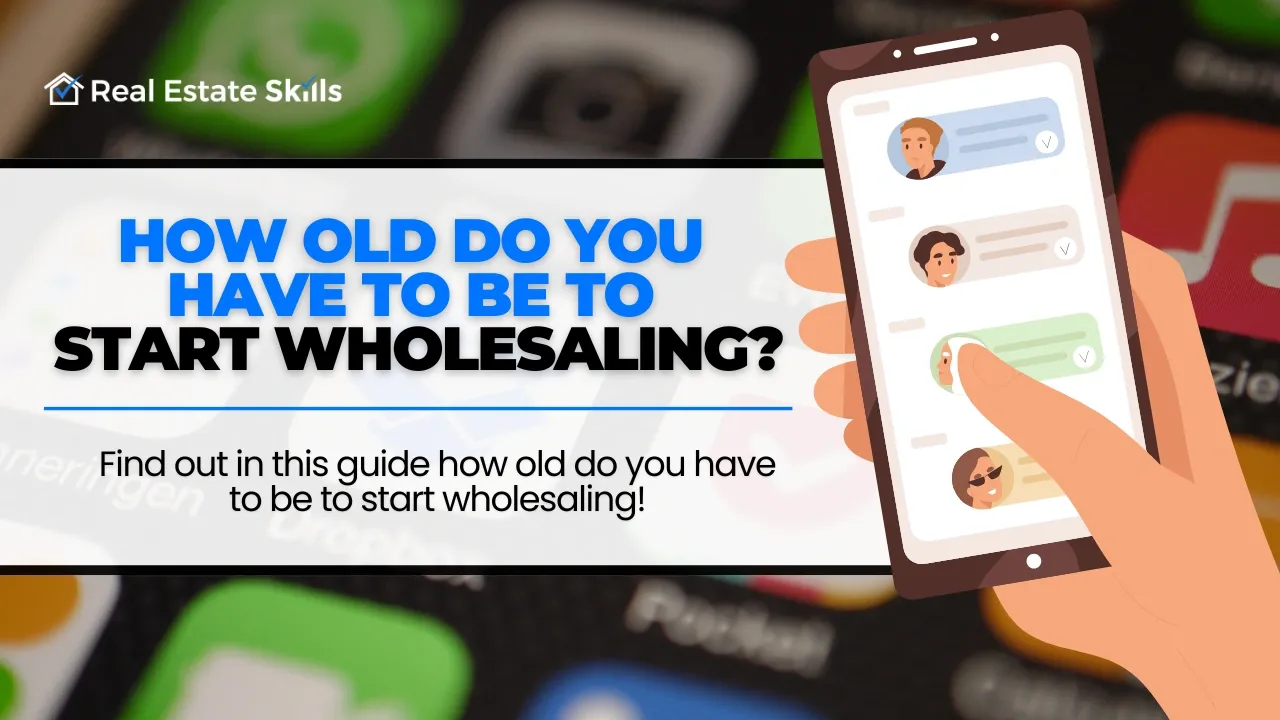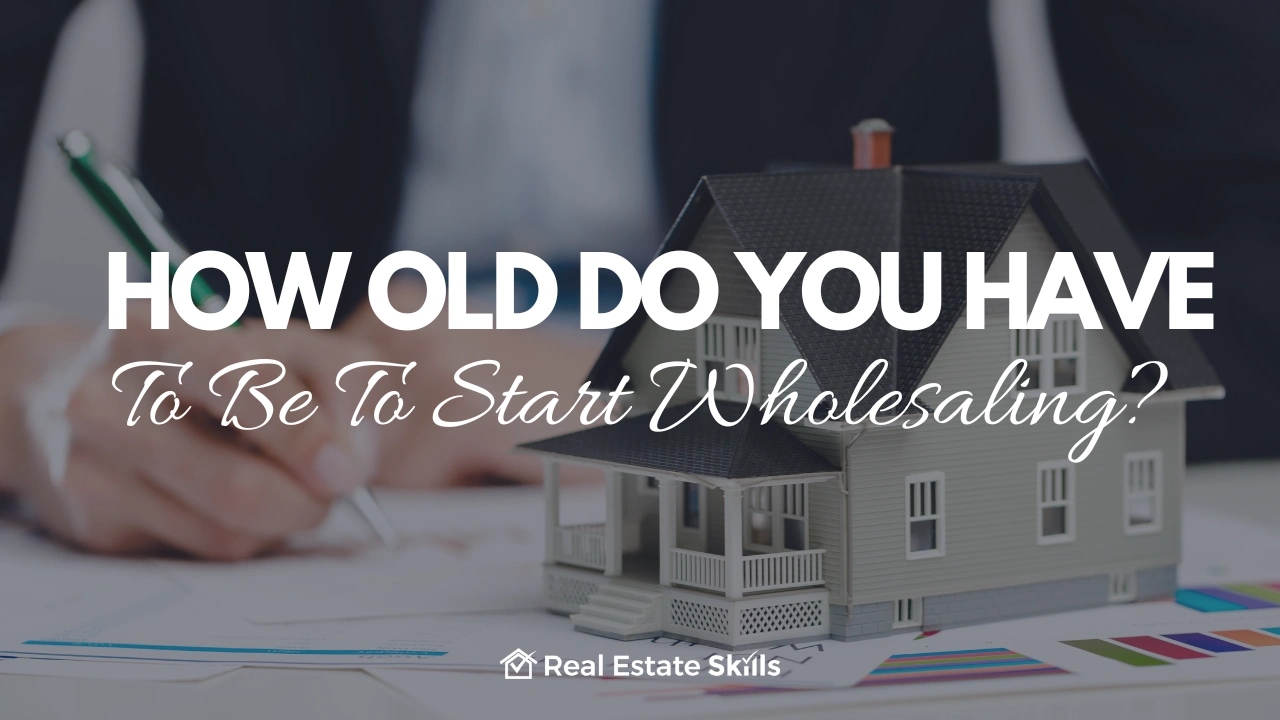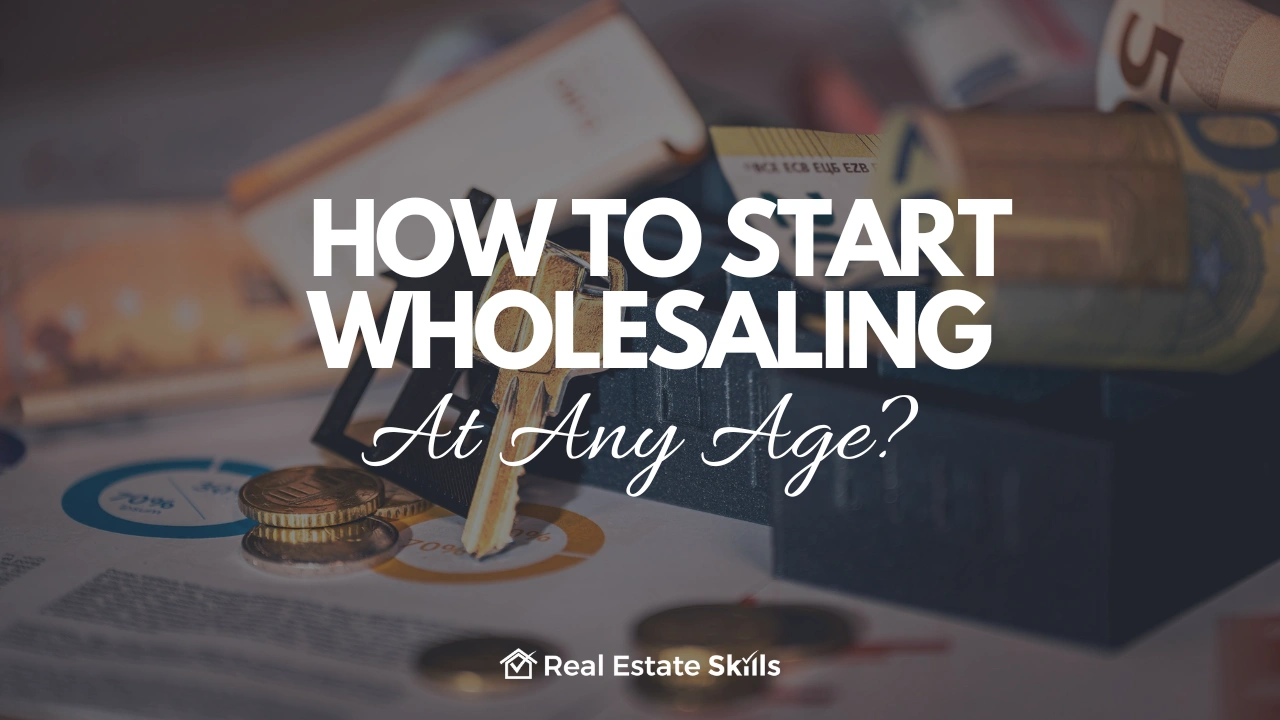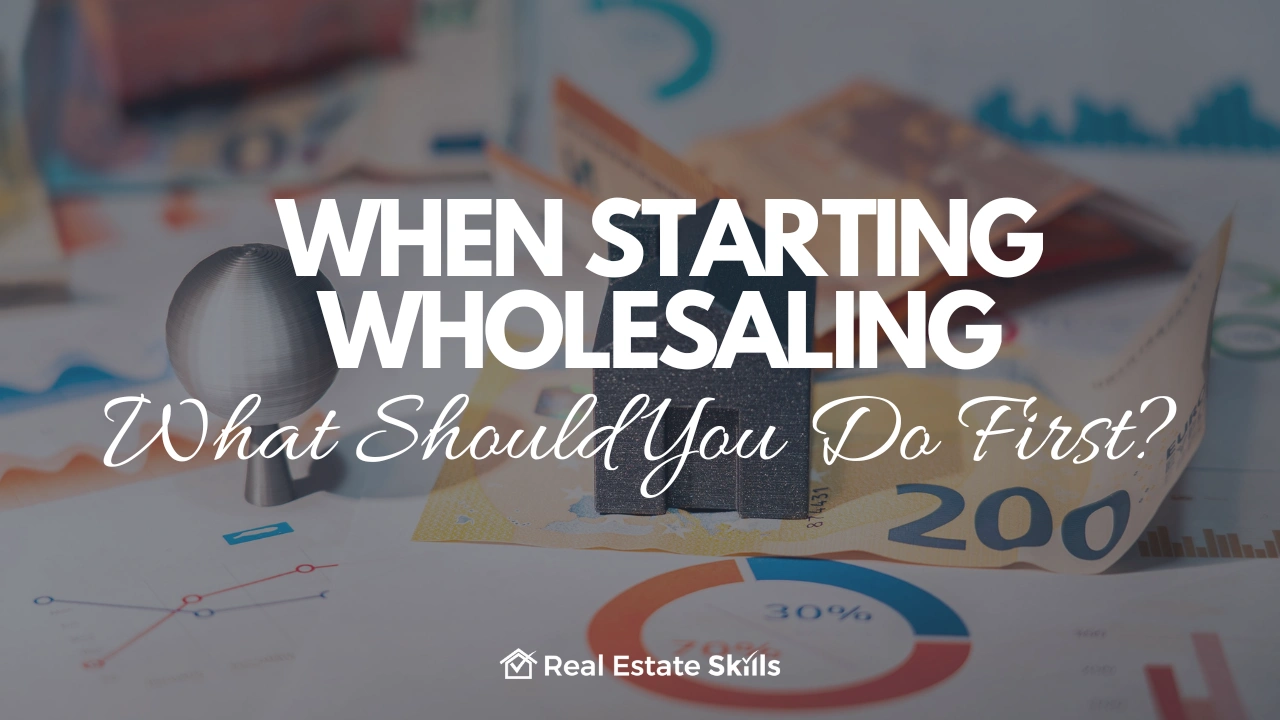
How Old Do You Have To Be To Start Wholesaling?
Oct 17, 2025
For most people, the word ‘entrepreneur’ conjures up visions of wealthy, innovative business people like Bill Gates or Mark Cuban. However, business acumen and insight are innate and intuitive skills and are not always a product of experience or age.
The real estate business has long been appealing to entrepreneurs because its investment strategies pair well with a creative, adept investor – someone who can think outside the box but within a defined legal framework.
With fantastic profit potential, it is not uncommon for teenagers to take simple curiosity and develop it into a lifelong passion and a potentially profitable career. To work with confidence and the required legal authority, you need to know how old you must be to start wholesaling real estate. This is discussed below.
- What Is Wholesaling Real Estate?
- How Old Do You Have To Be To Start Wholesaling?
- Can Teenagers Wholesale Real Estate?
- Can A Minor Wholesale Real Estate?
- How To Start Wholesaling At Any Age?
- When Starting Wholesaling What Should You Do First?
- Final Thoughts
If you’re serious about doing your first real estate deal, don’t waste time guessing what works. Our FREE Training walks you through how to consistently find deals, flip houses, and build passive income—without expensive marketing or trial and error.
This FREE Training gives you the same system our students use to start fast and scale smart. Watch it today—so you can stop wondering and start closing.
What Is Wholesaling Real Estate?
The art of wholesaling houses is a type of investment strategy that is quite popular because of its short-term investment timeline. The abbreviated timeline provided by those working in the real estate wholesaling business results in a reduced amount of time they must risk.
Wholesaling also generates a profit quicker than a house flippers investment because most wholesalers never even take possession of the investment property to complete the transaction. Conversely, those who are flipping houses typically take full legal possession.
The step-by-step process required in real estate wholesaling can be successfully negotiated with an owner-occupied, investment property, rental property, or any distressed properties -that may include foreclosure. The objective of real estate wholesalers is to find an undervalued property being sold by a motivated seller.
Next, the wholesaler enters a contract with the seller/homeowner to purchase the subject property for a mutually agreed-upon price – within a specified defined timeframe. This generally requires a small earnest money deposit held in escrow as a show of good faith.
Wholesalers generate a profit by assigning their equitable interest to another buyer at a higher price than the original contracted purchase price – before the first real estate wholesale transaction closes.
Wholesalers can also double-close the wholesale transaction. A double-closing is really two back-to-back closings, with the title passing through three parties – the original owner, the wholesaler, and the end buyer.
Read Also: Wholesale Real Estate Salary: How Much Can You Make Wholesaling?
How Old Do You Have To Be To Start Wholesaling?
Real estate wholesaling (or investing) requires the execution of a legally-binding document, known as a contract of sale. A contract (which is most often a bilateral contract) is simply a purchase agreement (oral or written) between multiple parties, wherein each party may have a legal obligation to perform.
If one party fails to perform the terms delineated in the contract, the other party has legal options to recoup damages.
However, to be legally valid, a contract or legal agreement must meet several requirements. A contract must include -
- A mutual agreement among the parties, which in real estate is often referred to as the meeting of the minds.
- A valid offer and an unqualified acceptance.
- Consideration deemed adequate.
- Legality – the purpose of the contract must not be unlawful.
- Capacity – this is the contract element that requires all parties to have the capability of understanding a) what they are signing and b) the ultimate legal consequences if either party fails to perform.
When an individual attains the age of majority, they are, by law, no longer a minor. Most states set forth the age of majority as 18. This is the age at which individuals are considered adults with the mental competency and the legal capacity to enter a binding contract. Exceptions to this age of majority include these states –
- Mississippi, where the age of majority is 21 for specific legal provisions – codified by Title 1 § 1-3-27.
- Nebraska, - the age of majority is 19 – see § 43-2101
- Alabama, where the age of majority is 19 – see Campbell v. Campbell.
Pro-Tip: Although it might be considered splitting hairs, from a technical perspective, a minor can enter a contract. What remains yet to be determined is whether a court of law will enforce or uphold the terms of the contract or sale agreement due to the minor's age. This is discussed in detail later in the narrative.
Seek legal advice from a trusted professional to avoid stepping into a legal situation you did not fully understand; the result may not be positive.
Can Teenagers Wholesale Real Estate?
Yes. Teenagers who have reached a legal majority will meet the required legal capacity to enter into a legally binding contract.
Except in the states of Mississippi, Nebraska, and Alabama, anyone who is 18, 19, 20, or 21 years of age can wholesale real estate because, according to relevant law, being 18 years of age (or older) establishes one’s legal adulthood.
Can A Minor Wholesale Real Estate?
Technically, wholesaling real estate has no lower age limit.
As noted above, reaching the age of majority is a required element of a legally enforceable contract of sale or agreement. A contract signed by a minor (i.e., someone who has not reached the age of majority or legal adulthood) is voidable.
A voidable contract is enforceable until one of the parties chooses to cancel it.
In real estate wholesaling, a minor can choose to cancel the contract as they did not, by law, meet the definition of legal capacity. Legal capacity is in place to protect those whose age may preclude them from fully understanding the requirements and consequences when executing a purchase contract. The law allows for the minor to exit a contract. However, the other party is still bound by the terms of the executed contract.
Pro-Tip: A contract with someone who is not yet 18 years old is not enforceable by the letter of the law. However, if both parties (where one is a minor) willingly choose to observe the terms of the contract, the agreement is still a contract.
Similarly, the minor as a party to a contract could assign their equitable interest to another end or cash buyer. However, the end buyer should recognize that the “assignment of contract,” issued by a minor, may not be binding should a conflict arise.
Alternatively, a minor could simply partner with a wholesaling mentor, family member, business partner, or friend who is of legal age and thus, has the legal capacity to enter a legally enforceable contract. A minor can easily be a part of the entire wholesale process without signing a contract.
For any questions or concerns regarding matters related to laws and potential legal consequences for non-compliance, it is smart to consult a professional for legal advice before delving head-first into a new wholesale investment property.
Read Also: Is Wholesaling Real Estate Legal?
How To Start Wholesaling At Any Age?
As noted above, from a technical legal perspective, wholesaling is an investment strategy that is available for anyone old enough to have an interest in real estate wholesaling and have the ability to understand the machinations of this investment technique.
The wholesaling minor can sign a contract. However, issues arise as to the legal enforceability of the agreement that has been executed by a party to a contract who has not yet reached the age of majority – a precept required for a valid contract.
Until a minor because of age in their jurisdiction, it is prudent to consider developing strategic partnerships with other experienced investors or even an interested family member or friend – as this allows the wholesaler to circumvent legal potholes created by contract law.
Strategic Partnerships can be formed with anyone who has the legal capacity to sign a contract of sale and is someone you know who:
a) Has skills that compliment your own,
b) Has reached the age of majority, and
c) Works with integrity and transparency.
Establishing working relationships with real estate professionals related to the wholesale real estate market may include –
- A favorite real estate agent, real estate broker, and realtor who holds a valid real estate license.
- An appraiser (to help find comps).
- A title company.
- Lenders or hard money sources, etc.
Partnerships can be formal or informal. These business planning options tend to be valuable in most business ventures, although their defined value differs in how they are used. In addition to steering clear of potential legal wranglings, a partner can also help you network and learn from their experience.
Because each member of the strategic partnership benefits from the arrangement, it forms a powerful synergy which is defined by the principle that the whole is greater than the sum of the parts. This essentially means that, for the most part, what one individual may do alone, many can do better.
"The whole is greater than the sum of the parts." -Aristotle
When Starting Wholesaling What Should You Do First?
The elapsed time it takes to start wholesaling is dependent on how quickly the newer wholesaler can learn the basics of wholesaling and develop an applicable business model to use moving forward as a real estate wholesaling investor.
The most important starting point for a new wholesaler is to acquaint yourself with relevant laws and regulations, including essential licensing information for real estate agents and other professionals. Next, beginning investors should educate themselves about real estate wholesaling.
The quickest and most cost-effective way to hit the ground running towards a successful real estate wholesaling career is to recognize how critical it is to educate yourself about the fundamentals of real estate wholesaling.
With free online training, you can begin to refine and expand your thinking about the wholesaling investment strategy. This approach is not only fast; online training programs help prevent you from being tempted to jump into a wholesaling deal where true risk lies without appropriate knowledge and guidance from the program’s curriculum and wholesaling colleagues participating in the same course.
A training program in real estate wholesaling offers excellent insight into the many facets and moving parts one must manage to successfully complete the wholesale transaction. They include, in part, -
- The importance and methods of sourcing leads that generate investment opportunities.
- Understand the significance of due diligence and transparency when wholesaling.
- Develop an understanding of the real estate industry standard investment criteria – or your own.
- Learn the 70% Rule – this rule offers a vital calculation that helps determine the viability of the wholesale real estate deal. The data required to use the 70% includes these data points –
- The subject property’s current value or purchase price.
- The subject property’s After-Repair-Value (ARV).
- The Maximum Allowable Offer (MAO) that a wholesaler should use should a decision be made to move forward.
- Learn how essential it is for a real estate wholesaler to develop a buyers list. A potential buyers list can include anyone interested in a wholesale property – from cash buyers to other real estate investors.
- The nuances of the real estate wholesaling business may be applicable to your particular market.
The practice of real estate wholesaling, from a theoretical perspective, is relatively straightforward. Once you have learned how to start real estate wholesaling, you must stay current with current and shifting market value metrics and trends that may require a wholesaler to modify current real estate investing strategies to stay competitive and profitable.
Also, check out this quick video that talks about how you can find cash buyers for free!
Final Thoughts
Wholesaling real estate is a terrific type of investment or business model that is suitable for most but often a great fit for people who either prefer (or have a natural tendency) for problem-solving and an innate entrepreneurial spirit or attitude. Wholesaling houses offer great control in terms the which hour you work and the pace and direction of one’s career.
The investment strategy of real estate wholesaling offers an accessible entrance ramp for curious younger investors to dabble and understand what it takes to find their place in wholesaling houses. Wholesaling real estate requires little investment capital and often has little to do with your credit score/worthiness, which makes it all that more desirable.
A partnership is a great way to solve concerns about a minor’s status in signing a real estate contract of sale. Plus, the partners allow you to refine your business strategies and objectives so that when you are ready, you have the skills and confidence to go it alone when you reach legal majority or legal adulthood. Either way, keep current with the market, do due diligence and plan business strategies to meet the objectives that you can apply at a future date.
If you’re serious about doing your first real estate deal, don’t waste time guessing what works. Our FREE Training walks you through how to consistently find deals, flip houses, and build passive income—without expensive marketing or trial and error.
This FREE Training gives you the same system our students use to start fast and scale smart. Watch it today—so you can stop wondering and start closing.
*Disclosure: Real Estate Skills is not a law firm, and the information contained here does not constitute legal advice. You should consult with an attorney before making any legal conclusions. The information presented here is educational in nature. All investments involve risks, and the past performance of an investment, industry, sector, and/or market does not guarantee future returns or results. Investors are responsible for any investment decision they make. Such decisions should be based on an evaluation of their financial situation, investment objectives, risk tolerance, and liquidity needs.











